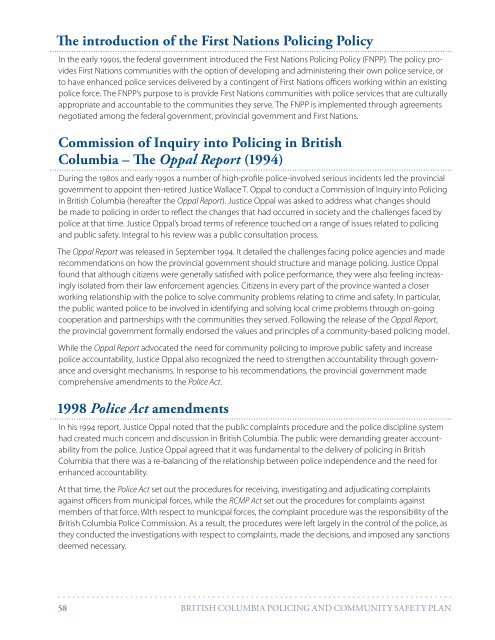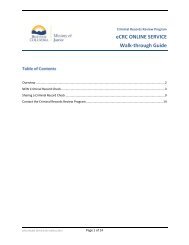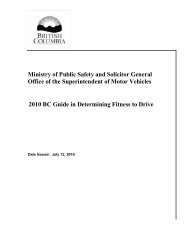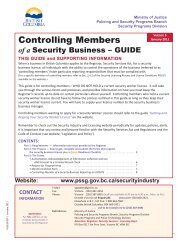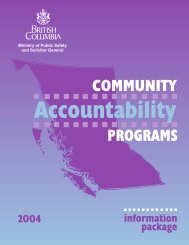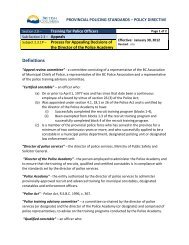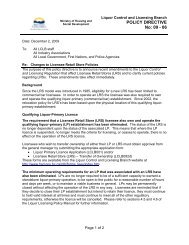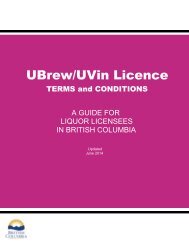BC Policing and Community Safety Plan - Ministry of Justice ...
BC Policing and Community Safety Plan - Ministry of Justice ...
BC Policing and Community Safety Plan - Ministry of Justice ...
Create successful ePaper yourself
Turn your PDF publications into a flip-book with our unique Google optimized e-Paper software.
The introduction <strong>of</strong> the First Nations <strong>Policing</strong> PolicyIn the early 1990s, the federal government introduced the First Nations <strong>Policing</strong> Policy (FNPP). The policy providesFirst Nations communities with the option <strong>of</strong> developing <strong>and</strong> administering their own police service, orto have enhanced police services delivered by a contingent <strong>of</strong> First Nations <strong>of</strong>ficers working within an existingpolice force. The FNPP’s purpose to is provide First Nations communities with police services that are culturallyappropriate <strong>and</strong> accountable to the communities they serve. The FNPP is implemented through agreementsnegotiated among the federal government, provincial government <strong>and</strong> First Nations.Commission <strong>of</strong> Inquiry into <strong>Policing</strong> in BritishColumbia – The Oppal Report (1994)During the 1980s <strong>and</strong> early 1990s a number <strong>of</strong> high-pr<strong>of</strong>ile police-involved serious incidents led the provincialgovernment to appoint then-retired <strong>Justice</strong> Wallace T. Oppal to conduct a Commission <strong>of</strong> Inquiry into <strong>Policing</strong>in British Columbia (hereafter the Oppal Report). <strong>Justice</strong> Oppal was asked to address what changes shouldbe made to policing in order to reflect the changes that had occurred in society <strong>and</strong> the challenges faced bypolice at that time. <strong>Justice</strong> Oppal’s broad terms <strong>of</strong> reference touched on a range <strong>of</strong> issues related to policing<strong>and</strong> public safety. Integral to his review was a public consultation process.The Oppal Report was released in September 1994. It detailed the challenges facing police agencies <strong>and</strong> maderecommendations on how the provincial government should structure <strong>and</strong> manage policing. <strong>Justice</strong> Oppalfound that although citizens were generally satisfied with police performance, they were also feeling increasinglyisolated from their law enforcement agencies. Citizens in every part <strong>of</strong> the province wanted a closerworking relationship with the police to solve community problems relating to crime <strong>and</strong> safety. In particular,the public wanted police to be involved in identifying <strong>and</strong> solving local crime problems through on-goingcooperation <strong>and</strong> partnerships with the communities they served. Following the release <strong>of</strong> the Oppal Report,the provincial government formally endorsed the values <strong>and</strong> principles <strong>of</strong> a community-based policing model.While the Oppal Report advocated the need for community policing to improve public safety <strong>and</strong> increasepolice accountability, <strong>Justice</strong> Oppal also recognized the need to strengthen accountability through governance<strong>and</strong> oversight mechanisms. In response to his recommendations, the provincial government madecomprehensive amendments to the Police Act.1998 Police Act amendmentsIn his 1994 report, <strong>Justice</strong> Oppal noted that the public complaints procedure <strong>and</strong> the police discipline systemhad created much concern <strong>and</strong> discussion in British Columbia. The public were dem<strong>and</strong>ing greater accountabilityfrom the police. <strong>Justice</strong> Oppal agreed that it was fundamental to the delivery <strong>of</strong> policing in BritishColumbia that there was a re-balancing <strong>of</strong> the relationship between police independence <strong>and</strong> the need forenhanced accountability.At that time, the Police Act set out the procedures for receiving, investigating <strong>and</strong> adjudicating complaintsagainst <strong>of</strong>ficers from municipal forces, while the RCMP Act set out the procedures for complaints againstmembers <strong>of</strong> that force. With respect to municipal forces, the complaint procedure was the responsibility <strong>of</strong> theBritish Columbia Police Commission. As a result, the procedures were left largely in the control <strong>of</strong> the police, asthey conducted the investigations with respect to complaints, made the decisions, <strong>and</strong> imposed any sanctionsdeemed necessary.58BRITISH COLUMBIA POLICING AND COMMUNITY SAFETY PLAN


